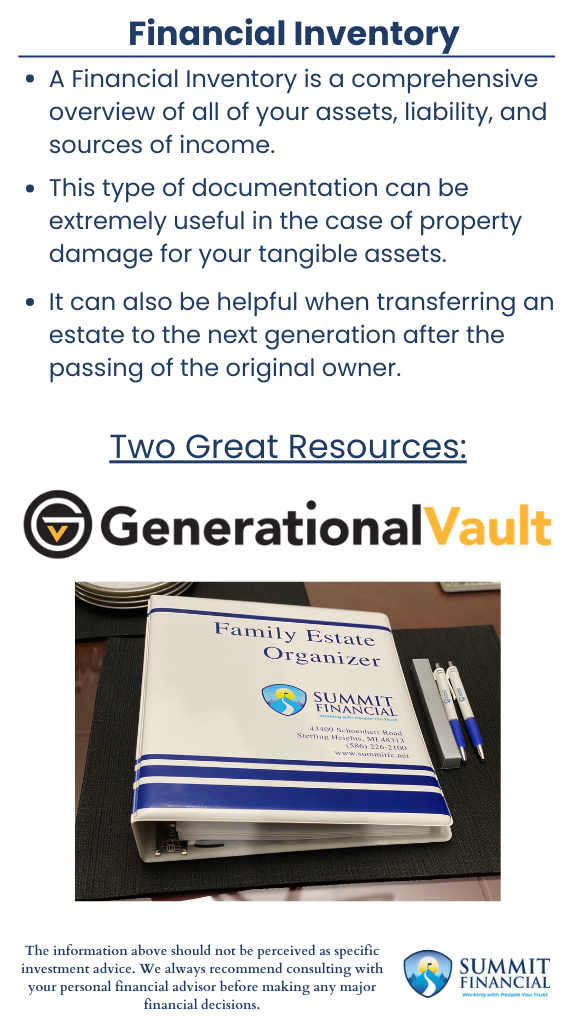As we enter 2024, making organization a priority can be an excellent New Year’s resolution. This goal can be pursued year-round or as part of a seasonal Spring-Cleaning regimen. This can range from decluttering your home, creating an efficient calendar or activity log at work, and updating your household Financial Inventory.
A Financial Inventory provides a comprehensive overview of your complete financial situation, including all assets, liabilities, and income sources. It summarizes your entire financial landscape. We have seen Financial Inventories range from high-level summaries with minimal details to exhaustive documents that are highly specific and include every possible detail.
Key Reasons for Maintaining a Financial Inventory
Two main reasons come to mind as to why we suggest keeping an updated Financial Inventory.
- Asset Protection in Property Damage: A Financial Inventory can provide critical documentation to support insurance claims for damaged or lost assets. Insurance companies typically require proof of ownership and value of claimed items. An inventory listing assets along with supporting documents like receipts validates claims by demonstrating proof of possession and worth. An easy way to accomplish this is to take a video recording of your home and assets. However, to come to a specific value you may need receipts or other supporting documents. If you store these documents on a home computer and it is included in the property damage, then it may be not easy to provide these supporting documents. This is why we typically recommend storing these on a cloud-based server, providing easy access from any location or device.
- Estate Transfer Assistance: A detailed Financial Inventory can greatly help beneficiaries by summarizing assets, incomes, and liabilities during estate transfers. This can be a stressful time for the beneficiaries and the challenge of locating various assets and liabilities is substantial. An organized inventory alleviates this burden by providing beneficiaries with a complete record of the estate’s finances. Without a detailed inventory, tracking down income sources, assets, and debts can lead to a prolonged settlement process. Since many people keep their finances private, certain accounts may be unknown to heirs. A Financial Inventory helps ensure no assets or liabilities are overlooked, avoiding missed accounts that can delay an estate settlement. Maintaining clear documentation of one’s finances greatly eases the transition for beneficiaries.

Resources for Effective Financial Inventory Management
We provide two main resources to help clients effectively manage their Financial Inventory:
- GenerationalVault.com Access: We offer access to www.generationalvault.com, a secure online platform where clients can link financial accounts and upload sensitive documents. This allows storage of home video recordings, account statements, and other inventory files in one centralized digital vault.
- Family Estate Organizer: We provide clients with a Family Estate Organizer – a three-ring binder including various handouts to outline one’s financial summary. Latest account statements can also be filed within the binder. When stored in a safe location, this prevents damage or loss of the important printed financial inventory information.
Maintaining a Financial Inventory- Highlights
- A Financial Inventory is a comprehensive overview of all your assets, liability, and sources of income.
- This type of documentation can be extremely useful in the case of property damage to your tangible assets.
- It can also be helpful when transferring an estate to the next generation after the passing of the original owner.
Speak With a Trusted Advisor
If you have any questions about a Financial Inventory, your investment portfolio, taxes, retirement planning, our 401(k)-recommendation service, or anything else in general, please call our office at (586) 226-2100. Please also reach out if you have had any changes to your income, job, family, health insurance, risk tolerance, or overall financial situation.
Feel free to forward this commentary to a friend, family member, or co-worker. We hope you learned something today. If you have any feedback or suggestions, we would love to hear them.
Best Regards,
Zachary A. Bachner, CFP®
with contributions from Robert Wink, Kenneth Wink, and James Wink
If you found this article helpful, consider reading:
Sources:


